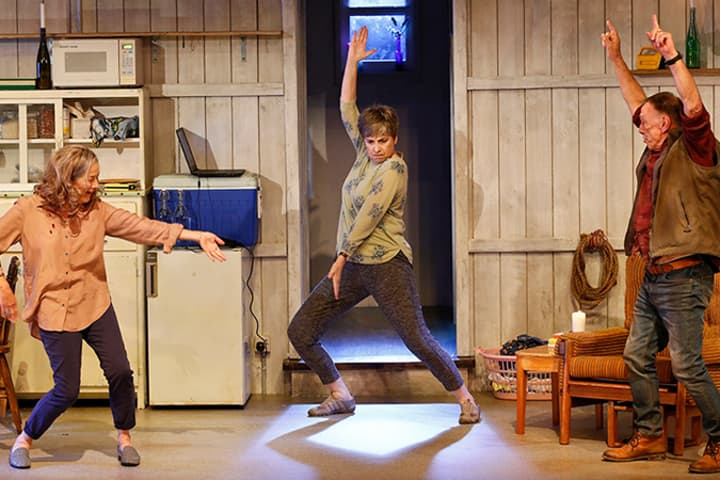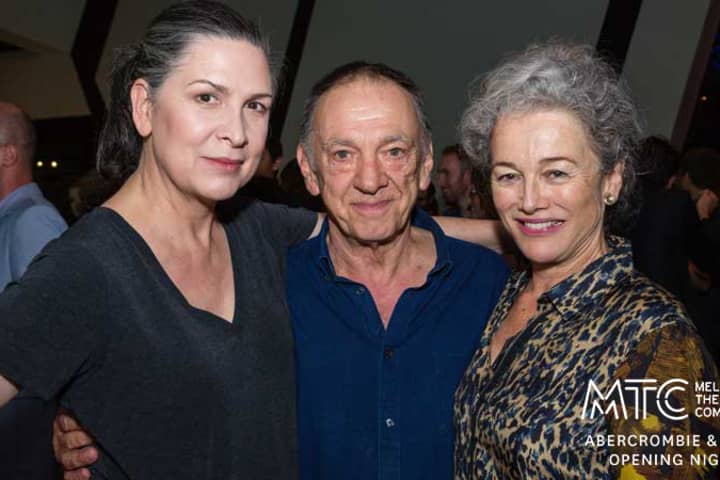MTC Associate Director Sarah Goodes takes on Lucy Kirkwood’s intimate new drama.
In an isolated cottage on the English coast, two retired nuclear physicists are living a quiet existence. Life is tough, electricity is rationed, and they keep a Geiger counter on hand. But they have worked all their lives for their retirement and now they are determined to enjoy it. Until one day, an old friend and colleague arrives unexpectedly, bringing memories of the past and a frightening challenge for the future.
What do you think the playwright of The Children, Lucy Kirkwood, is trying to say with this play? What are the things we are left with as an audience?
The first thing that hit me when I read the script was how such a seemingly small, detailed play could tap into such large themes and ideas, like intergenerational responsibility, and how we live our lives in our current times.
The story also has a loose correlation to the Fukushima nuclear disaster in Japan and the tsunami that happened there. I remember being deeply affected by that and watching quite a few documentaries about the overwhelming impact on the community, on people’s personal lives and the collective trauma it created.
I think Kirkwood is also interested in how we can live with less. We live in a society that is built on growth and accumulation. So, there’s a question in the play about how we could be richer with less rather than more – what that means culturally and philosophically.
Kirkwood’s previous play Chimerica, was this huge, expansive, globe-trotting thriller. On the other hand, The Children is a very personal, intimate chamber piece of three characters in one cabin. Her subject matter is just as ambitious – inter-generational responsibility, the environment – but she’s pared the scale right back. Why do you think that is and what is gained in that?
You could argue that she’s applying the idea of living with less to her own playwriting. I think it’s interesting that after writing such a global epic like Chimerica, she gave herself the challenge of how to explore epic themes in a very small, contained space.
She creates this wonderful tension by giving the characters nowhere to go. She closes the doors, she keeps it all happening in real-time. As a playwright, she’s really flexing her muscles to go from the epic to this very detailed playing space. Only an incredibly brave and talented playwright would give themself that challenge. And that’s what she is.
You’ve got Sarah Peirse, Pamela Rabe and William Zappa as the cast. What kinds of people are they playing?
Like any great playwright [Kirkwood’s] written a play where she’s got three characters that are entirely different instruments. Together, on stage they make great music.
Hazel (Pamela Rabe) and Rose (Sarah Peirse) are both physicists but they are the exact opposite to each other. Hazel is about routine, ritual of daily life, being organised, in control of the body, and therefore the mind while Rose embraces the chaos and unpredictability of life – they’re so different that they have this great kind of envy of each other’s qualities because they reflect back at each other exactly what they aren’t and at the same time they are both extremely territorial. It makes for great conflict.
Robin (William Zappa) has this incredible appetite for life, and for women. He’s an incredibly generous person who loves life – a quality that also gets him in trouble.
It’s not giving anything away to say there’s a love-triangle aspect to The Children. What’s the set-up?
Well, they’re in a very small cottage in England, somewhere on the east coast. It’s not a place you would normally live. It’s a place where you’d holiday or it might have been a fisherman’s cottage. There’s been a natural disaster that has damaged a nuclear reactor, so Robin and Hazel have had to move to this cottage because their family home was inside the exclusion zone. Their four children are grown up, living away.
Both Robin and Hazel worked at the nuclear reactor as nuclear scientists with Rose, but they haven’t seen Rose for 20 years. The play starts with Rose appearing at their door all of a sudden. Hazel knows that Rose and Robin were involved with each other before she and Robin had their first child. So, there’s this palpable tension about why Rose has shown up after all this time.
Are you keeping it set in England?
Yes, from research, I realised that Kirkwood might have loosely based the location on the village of Dunwich in Suffolk. There’s a nuclear reactor not far from there and, in the 13th century, it was this big, very important port that was almost entirely destroyed by several terrible storm surges. There’s a reference in the play to hearing the sound of church bells from under the ocean where the church fell in.
I’m working with Costume and Set Designer Elizabeth Gadsby and one of the things we’ve been talking about is the importance of the ocean in this work. In interviews with people who experienced the Fukushima tsunami, all of them use this incredible language of the experience of the Tsunami being unfathomable, overwhelming and incomprehensible. They can’t quite describe the enormity of this thing; the children who are interviewed talk about it being just as they had imagined a monster. In the play, Hazel talks in great detail about the moment of the tsunami coming. In both Japan and in the play, there’s a sense of this eerie peeling back of the ocean, and a stillness, before this rush of it coming forward as this unstoppable, primal force. With Elizabeth, I’ve talked a lot about how we might have the ocean present in the design – the pulse of the ocean. And how that pulse, that breathing of the ocean, comes together with the characters by the end of the play.
Learn more about Sarah Goodes’ 2018 productions in our MTC Talks podcast series.
Published on 28 August 2017





